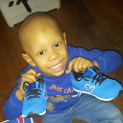Dual PTK7/GD2 Gamma Delta CAR T Cell Therapy for Neuroblastoma

Neuroblastoma is a deadly solid tumor of childhood and current therapy for high-risk disease has many long-term side effects. We therefore need new treatment that kills tumor cells but not normal cells. Most immunotherapy approaches use the patient’s own immune system to fight their tumor. “Cellular” immunotherapy works by taking blood from the patient, isolating certain infection-killing white blood cells, growing them up outside the body, engineering them to recognize the tumor, then infusing them back into the patient to kill their tumor. White blood cells called alpha-beta (αβ) T cells have been used this way in cancer patients (for example, CAR-T therapy for leukemias), but do not work well for pediatric solid tumors like neuroblastoma. Patient αβ T cells are also worn down by chemotherapy and therefore are not the best source for making a cell therapy product. A different white blood cell called a gamma delta (γδ) T cells, can directly kill neuroblastoma cells and can be taken from a healthy donor and safely given to a patient. We propose to use γδ T cells as a novel cellular immunotherapy for patients with neuroblastoma. We have developed a safer strategy to isolate and grow γδ T cells for human use. In the lab, we have shown that γδ T cells improve cancer killing by low dose chemotherapy and help tumor-targeting antibody therapies like the GD2 antibody dinutuximab to kill neuroblastoma tumors. This work led to a first in human clinical trial of healthy donor gamma delta T cells for patients with refractory/relapsed neuroblastoma.
Project Goal:
We now propose to make second-generation healthy donor γδ T cell therapies and translate them into novel clinical trials for patients with neuroblastoma. We will make gamma delta T cells more potent by genetically engineering them to express homing-proteins (called CARs) that target both GD2 and a novel neuroblastoma target called PTK7. These PTK7/GD2 CARs will take the T cell therapy directly to the tumor. We will further engineer PTK7/GD2 CAR γδ T cells to express proteins called cytokines (like IL-15 and IL-21) that help the CAR T cells live longer and be more potent when fighting the tumor. We will use novel assays to determine whether the number of GD2 and PTK7 molecules on the neuroblastoma cell surface affect PTK7/GD2 targeting γδ T cell responses. Most importantly, we will generate additional laboratory data needed to get approval for a first-in-child clinical trial of allogeneic expanded PTK7/GD2 CAR γδ T cells for patients with refractory/relapsed neuroblastoma.

